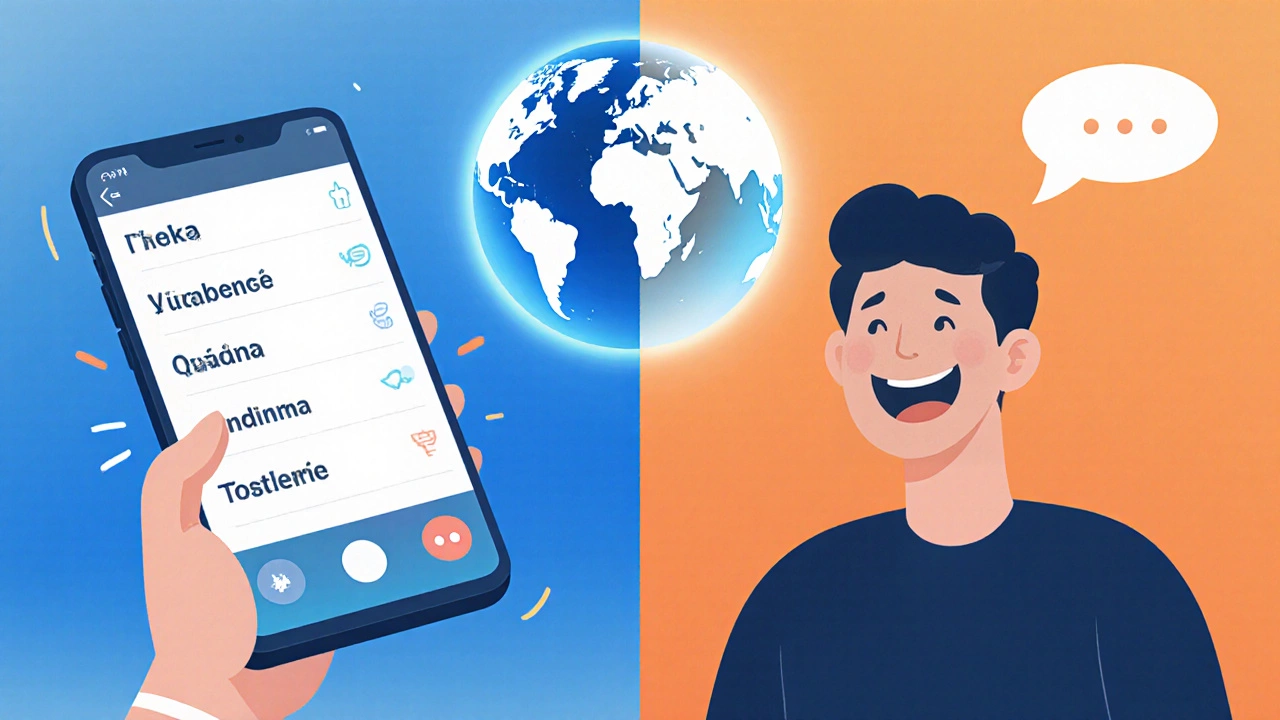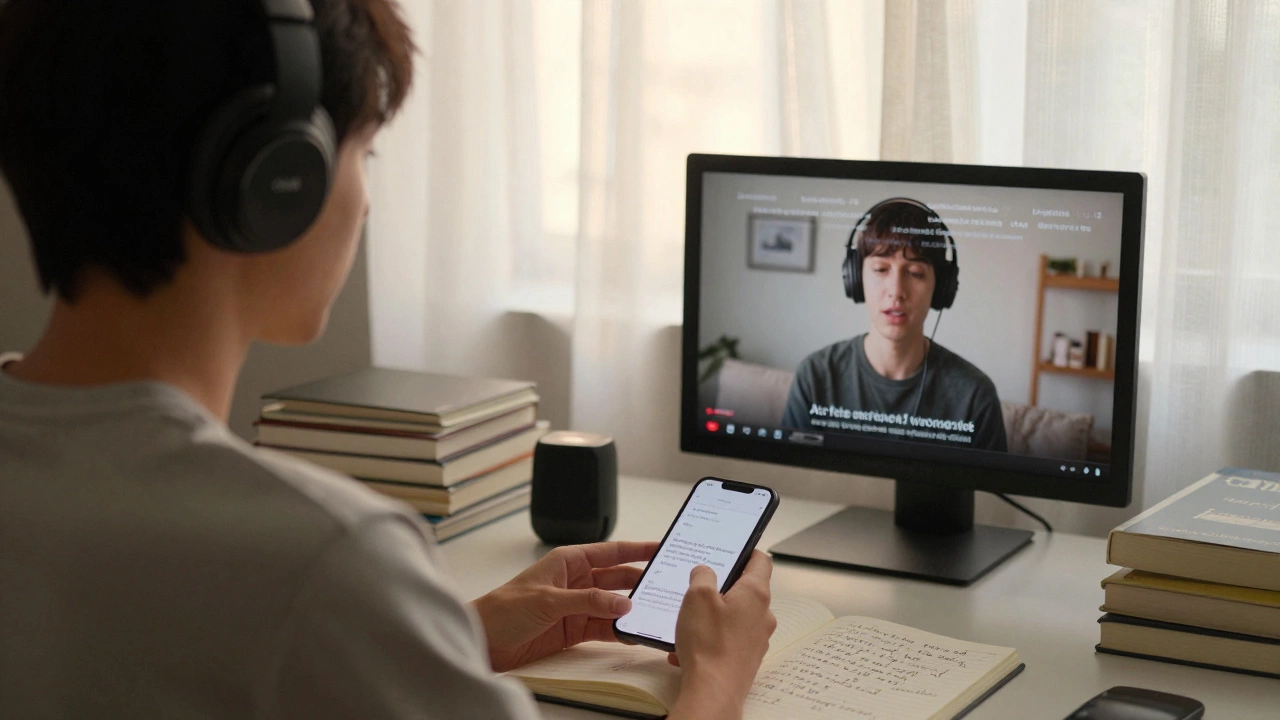What Is the Best Skill to Learn English? Speak Up, Not Just Study

English Speaking Fluency Tracker
Track your daily speaking practice to build fluency. Consistency beats intensity—just 5 minutes a day makes a difference.
Your Daily Practice
Your Progress
Start tracking your practice to see your progress
Key Insights
Remember: You don't need to be perfect—just consistent. The article shows that speaking daily for 5 minutes builds fluency faster than passive study.
Tip: Start small. Just 5 minutes of speaking practice today can make a difference. Your brain will thank you.
Most people think learning English means memorizing grammar rules, stacking up vocabulary lists, or watching movies with subtitles. But if you’ve ever tried to order coffee in London, ask for directions in Toronto, or explain your idea in a Zoom meeting with international colleagues-you know that’s not enough. The real breakthrough doesn’t come from textbooks. It comes from one thing: speaking.
Why Speaking Is the Only Skill That Actually Works
You can know every irregular verb in English and still freeze when someone asks you, ‘How was your weekend?’ That’s because language isn’t stored in your brain like a spreadsheet. It’s a muscle. And muscles only grow when you use them-under pressure, in real time, with real people.
A 2023 study from the University of Cambridge tracked 1,200 adult English learners over two years. Those who practiced speaking at least three times a week improved their fluency 40% faster than those who focused only on reading or writing. The difference? Speaking forces your brain to retrieve words instantly, manage pronunciation on the fly, and respond to unexpected questions. No app or quiz can replicate that pressure.
Think about how you learned your first language. You didn’t start with flashcards. You babble. You repeat. You get corrected. You try again. That’s the same path to English fluency-except now you have to build it yourself.
What Speaking Actually Includes (It’s More Than Just Talking)
Speaking isn’t just saying words out loud. It’s a mix of four things working together:
- Pronunciation - Saying ‘thirteen’ instead of ‘thir-teen’ so people understand you the first time
- Intonation - Raising your voice at the end of a question, dropping it for statements
- Fluency - Not pausing every three words to think of the next word
- Listening response - Reacting naturally, not just waiting for your turn to talk
Most learners ignore the last one. They listen to podcasts, memorize phrases, and then when someone speaks to them, they panic. Why? Because they trained their ears but not their mouth to respond. Real conversation isn’t a monologue-it’s a ping-pong game. You need to hit the ball back fast.
How to Start Speaking From Day One (Even If You’re Shy)
You don’t need to fly to London or enroll in a $500 course. You just need to start talking-today.
- Talk to yourself - Describe what you’re doing: ‘I’m making coffee. The kettle is boiling. I’m adding milk.’ Do this out loud in the shower, while walking, or commuting. Your brain gets used to forming sentences without translation.
- Use free voice chat apps - Try Tandem, HelloTalk, or Speaky. Filter for native speakers who want to learn your language. You get 15 minutes of English, they get 15 minutes of your language. No pressure. No judgment.
- Record yourself - Use your phone. Answer one question: ‘What did you eat for breakfast?’ Play it back. Don’t cringe. Listen. Where did you stumble? What words did you avoid? That’s your next focus.
- Join a local meetup - Cities like Sydney, Melbourne, or Brisbane have free English conversation circles. Search ‘English conversation group [your city]’ on Facebook or Meetup. People go to practice-not to be perfect.
- Watch and repeat - Pick a 30-second clip from a YouTube vlogger or Netflix show. Pause after each sentence. Say it out loud, copying the rhythm and tone. Do this five times. Your mouth learns the shape of English sounds.
One woman in Adelaide, 52, started speaking only after her grandson asked her to read him stories in English. She used YouTube videos of children’s books, paused every line, and repeated it. Six months later, she was chatting with her grandson’s teacher. No course. Just speaking.

What Doesn’t Work (And Why People Get Stuck)
Here’s what most learners do-and why it fails:
- Only studying grammar - Knowing ‘past perfect tense’ won’t help you say ‘I’d already left when she called.’ You need to say it, not label it.
- Waiting until you’re ‘ready’ - There’s no such thing as ready. You become fluent by doing, not by preparing.
- Listening without speaking back - Podcasts are great for exposure, but if you never answer, your brain never learns to produce.
- Translating in your head - ‘I want to say “I’m tired” but I don’t remember the word.’ Stop. Say ‘I’m tired’ in your language, then say it in English. Do it until the link forms.
People get stuck because they treat English like a math problem. It’s not. It’s a social skill-like riding a bike. You don’t learn by reading about balance. You learn by falling, getting up, and trying again.
How Long Until You See Results?
Most people expect fluency in six months. That’s unrealistic. But you can start seeing real progress in 30 days-if you speak daily.
By day 7: You’ll notice you can say simple things without pausing. ‘I like coffee.’ ‘It’s raining.’
By day 30: You’ll respond to basic questions without thinking. ‘How was your day?’ → ‘Good, busy, but okay.’
By day 90: You’ll start telling short stories. ‘Last week, I went to the market and…’
It’s not about knowing more words. It’s about using the words you know without fear.
What to Do When You Feel Embarrassed
You will mess up. You will say ‘I goed’ instead of ‘I went.’ You’ll mispronounce ‘thirteen’ as ‘thir-teen.’ Everyone does-even native speakers make mistakes.
Here’s the secret: The people you’re talking to don’t care. They’re not grading you. They’re just trying to understand you. Most of them have tried learning your language. They know how hard it is.
When you make a mistake, smile. Say, ‘Oops, I meant…’ and try again. That’s not failure. That’s progress.

What Comes After Speaking?
Once you can speak comfortably, other skills fall into place. Reading becomes easier because you recognize words you’ve already said. Writing becomes natural because you’ve already thought in English. Listening improves because you’re not waiting to translate-you’re waiting to understand.
Speaking is the key. Everything else unlocks after it.
Final Tip: Make It a Habit, Not a Task
Don’t say, ‘I’ll practice English tomorrow.’ Say, ‘I’ll talk out loud for five minutes before I brush my teeth.’ Attach it to something you already do. Consistency beats intensity every time.
One hour a week won’t change your life. Five minutes a day will.
Is it better to learn English by speaking or writing?
Speaking is far more effective for becoming fluent. Writing helps with structure and accuracy, but speaking builds speed, confidence, and real-time communication skills. If you can’t speak, you can’t use English in daily life-even if you write perfectly.
Can I learn English just by watching movies?
Watching movies helps with listening and accent exposure, but it won’t make you speak. You need to actively repeat lines, mimic tone, and respond to what you hear. Passive watching builds vocabulary, but active speaking builds fluency.
Do I need to take a course to learn to speak English?
No. Many free tools-like language exchange apps, YouTube channels, and local conversation groups-work better than expensive courses. What matters isn’t the class, it’s whether you’re speaking every day.
How do I find people to speak English with?
Use apps like Tandem or HelloTalk to connect with native speakers. Search Facebook or Meetup for ‘English conversation group’ in your city. Libraries, community centers, and even coffee shops often host free weekly meetups. Don’t wait for perfection-just show up.
What if I’m too shy to speak?
Start alone. Talk to yourself in the mirror. Record your voice. Then try a 5-minute chat with someone who’s also learning. Most people are nervous. You’re not alone. The more you speak, the less scary it becomes. Confidence comes from practice, not courage.
Next Steps: Your 7-Day Speaking Challenge
Here’s a simple plan to get you started:
- Day 1 - Say 5 sentences out loud about your morning routine.
- Day 2 - Record yourself answering: ‘What’s your favorite food and why?’
- Day 3 - Find one YouTube video, pause every 5 seconds, and repeat what’s said.
- Day 4 - Message someone on Tandem or HelloTalk. Say: ‘Hi, I’m learning English. Can we chat for 10 minutes?’
- Day 5 - Describe your favorite movie scene out loud without scripts.
- Day 6 - Go to a local meetup or join an online group. Just listen first.
- Day 7 - Say one thing you’re proud of this week. Out loud. To yourself.
You won’t be fluent in a week. But you’ll be a speaker. And that’s the only thing that matters.


